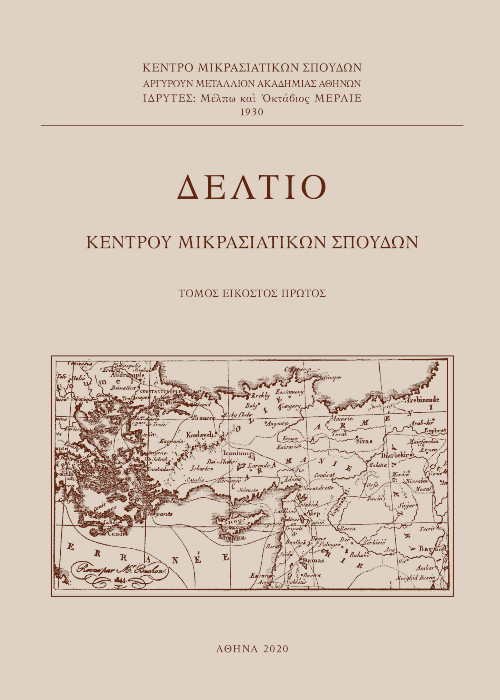A 17th century non-liturgical christmas song from Mount Athos
Abstract
The place held bynon-liturgical music in manuscripts of the Byzantine and
post Byzantine periods is negligible, since up to the mid-nineteenth century
byzantine notation was employed almost exclusively for liturgical purposes^
Cod. Zakynthos 8 written by a Greek monk from Mount Athos in 1698 seems
to be an ordinary Hirmologion. But it is exceptional, as it contains a few
melodies intended for use outside the church. One of these is a Christmas song
based on a text with an alphabetic acrostic starting with the words «Άναρχος
Θεός». The remaining eight examples in the secular section of the manuscript
use Turkish texts written with letters of the Greek alphabet. A photographic
reproduction of the «’Άναρχος Θεός» was first published by Hatziyakoumis in
1980. But he did not supply a clear rendering of the text and a transcription of
the melody into modern notation. Besides filling up this gap the present paper
offers a musical and textual analysis of the song and compares it to carols with
similar texts from Cappadocia and the Pontos, which were handed down to us
by oral tradition.
Article Details
- How to Cite
-
Δραγούμης Μ. Φ. (1993). A 17th century non-liturgical christmas song from Mount Athos. Bulletin of the Centre for Asia Minor Studies, 10, 23–36. https://doi.org/10.12681/deltiokms.95
- Issue
- Vol. 10 (1993)
- Section
- Articles

This work is licensed under a Creative Commons Attribution-NonCommercial-ShareAlike 4.0 International License.
Authors who publish with this journal agree to the following terms:
- Authors retain copyright and grant the journal right of first publication with the work simultaneously licensed under a Creative Commons Attribution Non-Commercial License that allows others to share the work with an acknowledgement of the work's authorship and initial publication in this journal.
- Authors are able to enter into separate, additional contractual arrangements for the non-exclusive distribution of the journal's published version of the work (e.g. post it to an institutional repository or publish it in a book), with an acknowledgement of its initial publication in this journal.
- Authors are permitted and encouraged to post their work online (preferably in institutional repositories or on their website) prior to and during the submission process, as it can lead to productive exchanges, as well as earlier and greater citation of published work (See The Effect of Open Access).












